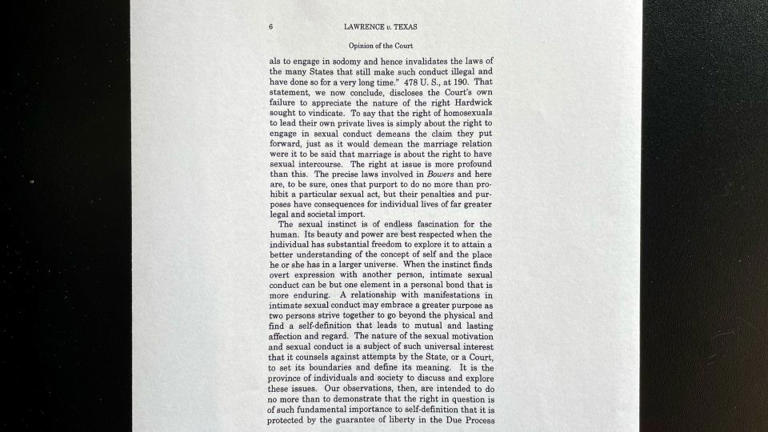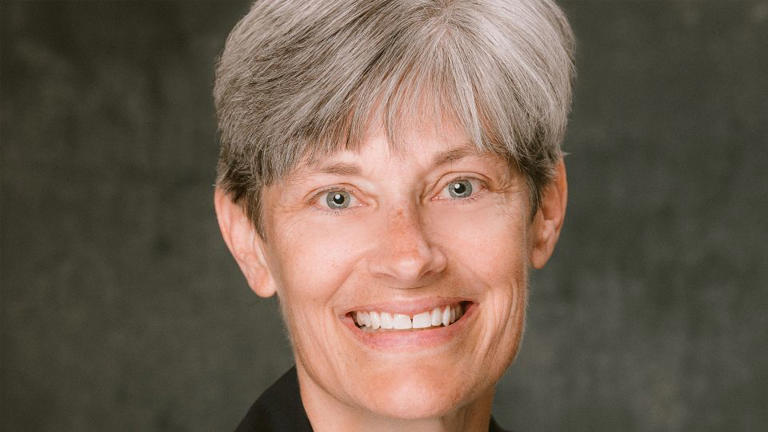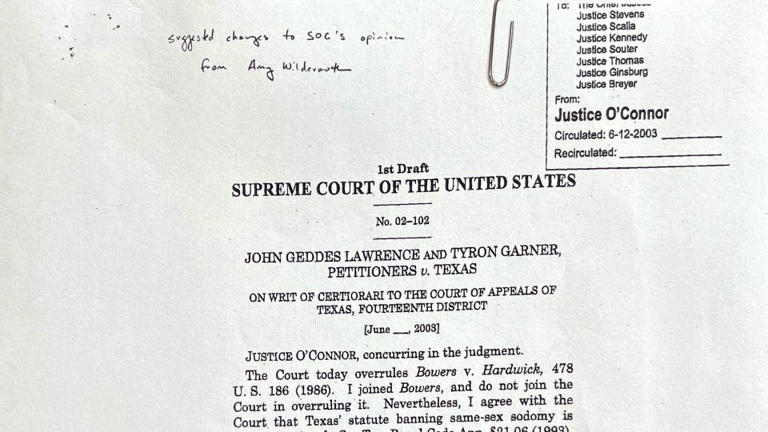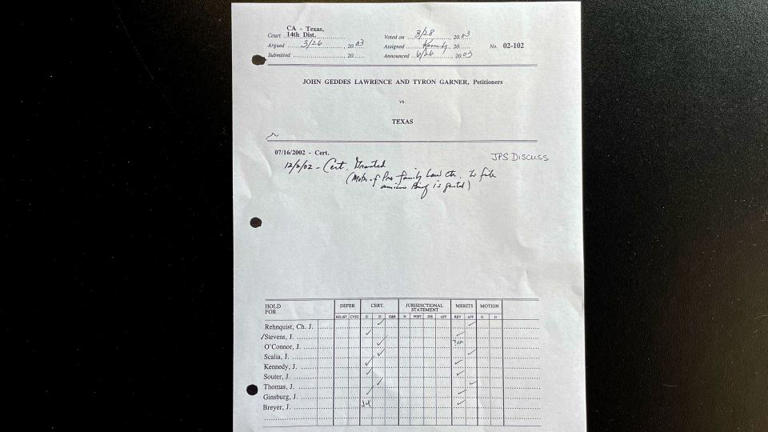Story by Joan Biskupic • CNN
In spring 2003, Supreme Court Justices Anthony Kennedy and Sandra Day O’Connor were ready to break ground on gay rights by striking down a ban on intimate relations between same-sex couples.
The landmark decision set the country on a new path and helped lay the foundation for the 2015 court decision declaring a nationwide right to same-sex marriage. Once-private court papers reviewed by CNN and related interviews reveal the internal debate of key justices concerned with LGBTQ rights but moving carefully. Kennedy, writing for the court in the anti-sodomy case, struggled as he outlined the constitutional right at issue and considered using phrases such as “the sexual instinct.”
The papers also show that O’Connor, penning an important concurring opinion, sought guidance from a woman believed to be the only openly gay clerk in any of the nine chambers at the time.
Lawrence v. Texas, issued 20 years ago this month, came before the court at a time when stigma, social norms and violence led many gay Americans to keep their private lives hidden.
Just a few years earlier, in 1997, actor and comedian Ellen DeGeneres drew international headlines for being a rare public figure to come out. In 1996, Democratic President Bill Clinton signed the Defense of Marriage Act, prohibiting federal recognition of same-sex marriages; that law, which defined marriage as a union between one man and one woman, would not be struck down until 2013.
Getting to the 6-3 ruling in 2003 was no small matter. Kennedy, an appointee of President Ronald Reagan working with justices on the left side of the bench, went through nearly 10 drafts as he explained the Constitution’s protection for same-sex relations and inevitably took a major step toward same-sex marriage.
Kennedy, who held the key vote in this line of cases, was also cognizant of religious interests within the court and beyond. That tension between LGBTQ rights and religion is still evident in controversies at the high court today.
Back in 2003, the one openly gay law clerk, Amy Wildermuth, worked for Justice John Paul Stevens, and he saved suggestions that Wildermuth, now a law professor, made on O’Connor’s first draft. The document is among Stevens’ files recently opened at the Library of Congress.
At the top of Stevens’ copy of O’Connor’s first draft is the small notation, “Suggested changes to SOC’s opinion from Amy Wildermuth.” Throughout the eight-page draft are various edits, mainly concerned with the nuances of phrasing.

How the Supreme Court struck down anti-sodomy laws and paved way for same-sex marriage© Provided by CNNText from first draft of opinion in Lawrence v. Texas by Justice Anthony Kennedy. References to the "sexual instinct" were removed in subsequent drafts - CNN
“‘Are we using the right terms?’ ‘Are we saying this in a way that could be offensive?’ If you’re not in the culture, you just don’t know,” Wildermuth said in an interview with CNN about the kinds of questions that came her way.
Wildermuth, now teaching at Ohio State Moritz College of Law, emphasized the era, when justices were less familiar with LGBTQ interests. “I was happy to share my perspective,” she said. “It was not something I was uncomfortable with.”
Nothing in the Stevens files indicated why Wildermuth was enlisted. When reached by CNN, she explained, “It wasn’t unusual for people working on cases to be asked to help the clerks in other chambers, to provide feedback. It also was true that I was the only out gay law clerk at the time. That may also have prompted interest in getting feedback from me and from my co-clerks.”
(Other law clerks serving in other chambers that session similarly remembered Wildermuth as the only openly gay clerk that term.)
Kennedy conferred with Stevens, Stephen Breyer and other justices on his left. In his first draft striking down the Texas sodomy ban, Kennedy described the right in question to be “of such fundamental importance to self-definition that it is protected by the guarantee of liberty in the Due Process Clause.”
After several drafts, according to Stevens’ files, Kennedy decided to avoid the word “fundamental.”
Kennedy also withdrew language that some of his colleagues regarded as awkward or out of place, such as, “The sexual instinct is of endless fascination for the human. Its beauty and power are best respected when the individual has substantial freedom to explore it to attain a better understanding of the concept of self and the place he or she has in a larger universe.”
His final opinion, instead, said in that section, “When sexuality finds overt expression in intimate conduct with another person, the conduct can be but one element in a personal bond that is more enduring. The liberty protected by the Constitution allows homosexual persons the right to make this choice.”
And, although he dropped the reference to “a fundamental right” – a move a dissenting Justice Antonin Scalia pointed to with some satisfaction – the majority opinion deliberately retained expansive language regarding the personal liberty of gay people and forbidding states to “define the meaning of the relationship” or “demean their existence.”
Overturning a 1986 decision
The Supreme Court in 1986 had upheld sodomy bans in the Georgia case of Bowers v. Hardwick. By 2002, when the Texas case came before the court and tested whether Bowers should be reversed, only a handful of states had such laws on the books, and they were rarely enforced.
The new controversy began when police officers in Houston responded to a report of a weapons disturbance, entered the private home of John Geddes Lawrence and found him engaging in a sexual act with another man. The men were charged under a statute that criminalized “deviate sexual intercourse.” They challenged the constitutionality of the Texas ban on their private conduct.
When the nine justices considered in December 2002 whether to take up the appeal, Stevens, Kennedy, David Souter and Ruth Bader Ginsburg voted to hear the case. (It takes four to grant a case a hearing but five to decide it.)
Breyer signaled that he wanted to hear the case, too, Stevens’ notes indicate, but only if those ready to hear it were prepared to stick together for a majority to reverse Bowers’ holding that constitutional due process of law does not cover private same-sex relations.
Then-Chief Justice William Rehnquist and Justices O’Connor, Scalia and Clarence Thomas voted to let the lower court action and the charges against the men stand. It is not known why O’Connor voted against the appeal at this stage, but she may have wanted to avoid confronting her vote with the majority in the earlier Bowers case.
After oral arguments on March 26, 2003, the five votes held, according to Stevens’ notes from their private meeting, and O’Connor moved to their side as well. She wanted to reverse the lower court ruling, on the grounds that the Texas law violated the equal protection of the law. That allowed O’Connor, also an appointee of Ronald Reagan, to avoid casting a vote to outright reverse her Bowers v. Hardwick position.
Stevens, the senior justice on the prevailing side, had the power to assign the opinion for the court and he chose Kennedy. The centrist-conservative Kennedy was crucial to keeping their left-leaning majority together; he also had begun to express great passion about protecting the dignity and rights of gay people.
Kennedy circulated his first draft on May 14, 2003. Over the next several weeks, he worked with other justices in the majority to refine the explanation of the rights and relationships at issue. The thorny dilemma, law clerks from that session told CNN recently, was to craft an opinion that would do more than merely lift criminal penalties for same-sex conduct, by broadly protecting personal liberty, yet be cautious about laying down obvious markers toward same-sex marriage.
“After reading my first circulation, Stephen suggested revisions to make it clear we do not decide more than the question presented,” Kennedy wrote on June 10 of that year of a conversation with Breyer. “These, plus a few other edits, are contained in a new circulation to the entire Court. Stephen’s suggestions were quite constructive, and I am hoping how he can join.”
Another Kennedy draft circulated soon after emphasized that the Bowers majority had wrongly presumed a long history of laws aimed at gay relations – one of the points Breyer had raised during oral arguments.
“Contrary to the assumption underlying Bowers, there is no longstanding history in this country of laws directed at homosexual conduct as a distinct matter,” the draft opinion stated.
That sentence was further edited to say, “At the outset it should be noted that there is no longstanding history in this country of laws directed at homosexual conduct as a distinct matter.”
Wildermuth’s influence on O’Connor
The once-private files of a single justice only provide a partial view into the thinking of the nine, and it could not be determined whether some memos had been removed from the Stevens’ files before court officials turned them over to the Library of Congress. Clerks contacted by CNN from various chambers said they were aware of negotiations among justices in the Lawrence case that are not documented in the available materials.
But the thoughts of one law clerk that term, Wildermuth, endure in the Stevens’ files. O’Connor, who faulted Texas for targeting certain conduct of same-sex couples, but not opposite-sex couples, adopted some of Wildermuth’s suggestions and bypassed others.

Amy Wildermuth - Courtesy Amy Wildermuth
In her conclusion, for example, O’Connor had originally written, “A law branding one class of citizens as criminal solely because the majority disapproves of the defining characteristic of the class runs contrary to the values of the Constitution and the Equal Protection Clause.”
O’Connor changed it to Wildermuth’s suggested language: “A law branding one class of persons as criminal solely based on the State’s moral disapproval of that class and the conduct associated with that class runs contrary to the values of the Constitution and the Equal Protection Clause.”

Draft of concurrence from Justice Sandra Day O'Connor with reference to clerk Amy Wildermuth. - CNN
Conservatives’ religious objections
Throughout all of his drafts, Kennedy continued to acknowledge religious and moral objections.
When he observed that sodomy bans had flowed from condemnation of “homosexual conduct as immoral,” he added, “The condemnation has been shaped by religious beliefs, conceptions of right and acceptable behavior, and respect for the traditional family. For many persons these are not trivial concerns but profound and deep convictions accepted as ethical and moral principles to which they aspire and which thus determine the course of their lives.”
When Kennedy in 2015 wrote the Obergefell v. Hodges decision declaring a fundamental right to same-sex marriage, he echoed that additional theme. “It must be emphasized that religions, and those who adhere to religious doctrines, may continue to advocate with utmost, sincere conviction that, by divine precepts, same-sex marriage should not be condoned.”
And in a line that opponents of LGBTQ rights often repeat, Kennedy wrote, “Many who deem same-sex marriage to be wrong reach that conclusion based on decent and honorable religious or philosophical premises.”
During oral arguments this session, for example, over whether a wedding website designer can refuse same-sex couples despite a Colorado anti-discrimination law, the web designer’s lawyer, Kristen Waggoner, referred to Kennedy’s “decent and honorable” phrasing.
So did Justice Samuel Alito, a consistent dissenter on LGBTQ protections.
Responding to Alito, Colorado solicitor general Eric Olson, defending the state anti-discrimination law, noted that the reference to “honorable” people was incomplete.
Olson emphasized that in Obergefell, Kennedy had gone on to say: “(W)hen that sincere, personal opposition becomes enacted law and public policy, the necessary consequence is to put the imprimatur of the State itself on an exclusion that soon demeans or stigmatizes those whose own liberty is then denied.”
That case, 303 Creative v. Elenis, is scheduled to be announced in upcoming days; coincidentally, Olson was a law clerk to Stevens in the 2002-03 session.
Scalia’s angry dissent
Of the nine justices who heard the Lawrence case, only Thomas remains on the bench. He, along with Rehnquist and Scalia, dissented.
Scalia wrote the principal dissent for the trio, but Thomas penned an additional short statement criticizing the Texas law as “uncommonly silly.”
“If I were a member of the Texas Legislature, I would vote to repeal it,” Thomas wrote. “Punishing someone for expressing his sexual preference through noncommercial consensual conduct with another adult does not appear to be a worthy way to expend valuable law enforcement resources.”
Scalia’s dissent was characteristically lacerating, and as he worked on his own drafts in late June, he added a warning about how the case could lead to the court’s endorsement of same-sex marriage.

Justice Stevens' record of the justices' private votes on whether to hear the case of Lawrence v. Texas (that is, grant or deny certiorari) and then whether to reverse or affirm the lower court ruling against the men. - CNN
As he noted that “not once does it describe homosexual sodomy as a ‘fundamental right’ or a ‘fundamental liberty interest,’” Scalia said the majority nonetheless “dismantles the structure of constitutional law that has permitted a distinction to be made between heterosexual and homosexual unions, insofar as formal recognition in marriage is concerned.”
In his final edits, Scalia wrote, “The Court says that the present case ‘does not involve whether the government must give formal recognition to any relationship that homosexual persons seek to enter.’ Do not believe it.”
Twelve years later, to the exact June 26 day, the court declared a constitutional right to same-sex marriage.

No comments:
Post a Comment